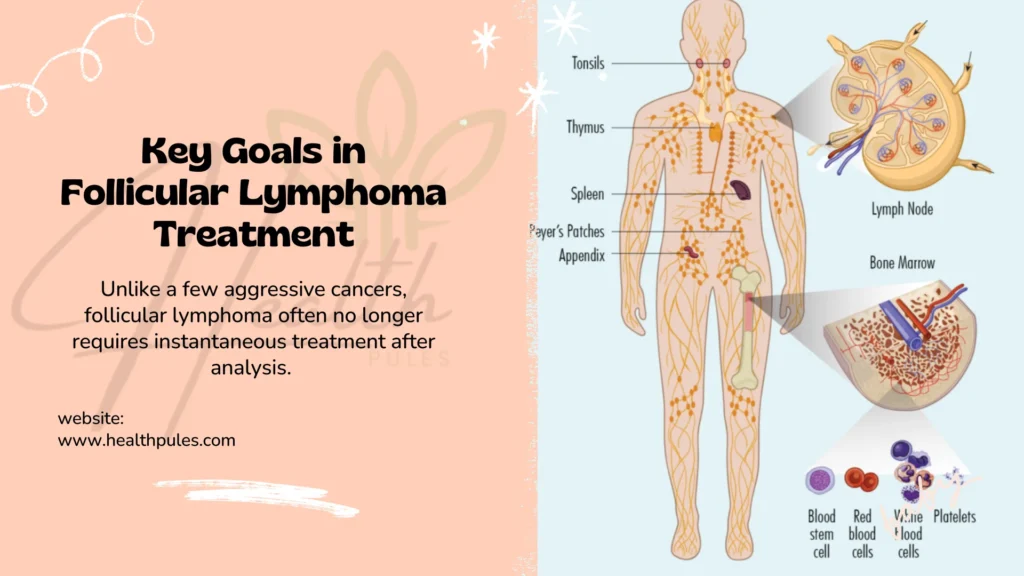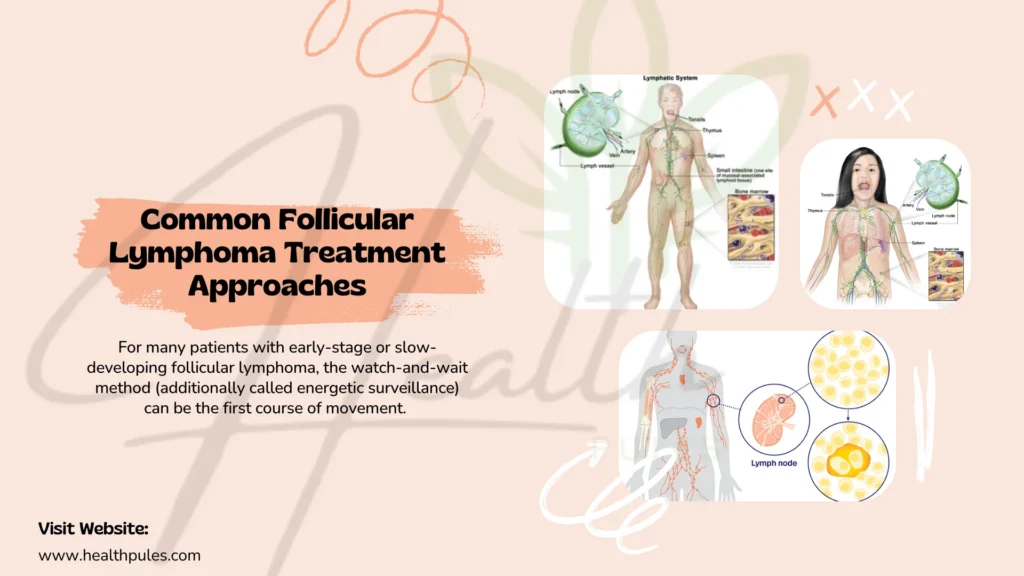Follicular lymphoma is a type of non-Hodgkin lymphoma (NHL) that starts in B-cells, a sort of white blood portable cell that is pivotal to the resistant contraption. It is viewed as a lethargic or slow-developing malignant growth, which could give it additional possibilities in its beginning phases, but extreme to manage in its later stages. Unlike aggressive types of lymphoma, follicular lymphoma regularly calls for a nuanced approach to remedy, thinking about the patient’s usual health, the development of the sickness, and different elements.
In this pamphlet, we’ll investigate the various follicular lymphoma cure choices, including each customary treatment and state-of-the-art strategies that can introduce new cravings for patients.
What Is Follicular Lymphoma?
Follicular lymphoma is the second most normal sort of non-Hodgkin lymphoma, representing around 20-30% of all NHL occasions. It regularly influences grown-ups, with most determination occurring in people beyond 60 years old. while it’s far sluggish creating, follicular lymphoma is regularly now not repairable in its postgraduate education. However, sufferers can stay for decades with the right management and remedy.
The ailment is staged from I to IV, with stage I being early localized disease and degree IV representing superior disease that has spread to diverse elements of the frame, such as the bone marrow or other organs. The kind of cure picked depends to a great extent on the phase of the illness, the patient’s signs, and standard wellness.
Hope you will like to read this article: Effective Treatment Options for Stage 1 Lung Cancer

Key Objectives in Follicular Lymphoma Treatment
Not at all like a couple of forceful tumors, follicular lymphoma frequently no longer requires prompt treatment after investigation. In a few cases, medical doctors may additionally undertake a watch-and-wait method, intently monitoring the affected person without lively remedy till symptoms rise or the disease progresses. while remedy will become vital, the dreams are often to:
- Manage the disorder for as long as possible
- Control signs and enhance the patient’s exceptional of lifestyles
- Delay the development of the ailment
- Reap long-term remission, even though a whole treatment can be not likely
The selection of treatment varies based on the degree and the aggressiveness of the ailment, with various alternatives to be had.
Common Follicular Lymphoma Treatment Approaches
1. Watch-and-Wait Approach
For many patients with early-stage or slow-developing follicular lymphoma, the watch-and-wait method (additionally called energetic surveillance) can be the first course of movement. This method entails every day taking a look at stand tests to screen the development of the disease without starting a remedy right away.
Many patients can continue to be symptom-unfastened for years, and remedy may additionally most effectively end up essential if the lymphoma starts off evolved to develop more hastily, causes signs and symptoms, or affects the body in an extensive manner. This approach allows patients to avoid the potential side results of remedy until definitely important.
Advantages:
- Avoids needless remedy
- Preserves the satisfaction lifestyles within the absence of signs and symptoms
- Permits sufferers to advantage from advancements in treatment within the destiny
Disadvantages:
- The mental pressure of knowing the ailment is present without an active remedy
- A few sufferers can also sense demands about delaying treatment
2. Radiation Therapy
For sufferers diagnosed with stage I or localized follicular lymphoma, radiation remedy is a commonplace and often curative choice. Radiation uses high-power beams to kill most cancer cells in a focused place. While follicular lymphoma is caught in its early stages, localized radiation can frequently get rid of most cancers or provide long-term remission.
Advantages:
- Powerful for early-degree disease
- Non-invasive and can be executed on an outpatient foundation
- minimum systemic side consequences as compared to chemotherapy
Disadvantages:
- now not effective for enormous or advanced-degree lymphoma
- potential for localized side effects like pores and skin infection or fatigue
3. Immunotherapy and Monoclonal Antibodies
Immunotherapy addresses a major reinforcing inside the solution for follicular lymphoma. One of the most broadly utilized kinds of immunotherapy is monoclonal antibodies, including rituximab (Rituxan). Rituximab mostly focuses on the CD20 protein situated on the floor of B-cells, denoting the dangerous cells for obliteration with the guide of the resistant framework.
Rituximab is habitually blended in with chemotherapy (R-Slash or R-CVP), or utilized as a solitary specialist, uniquely in victims who are areas of strength not so much for chemotherapy.
Advantages:
- distinctly effective for each newly recognized and relapsed sufferer
- Fewer side outcomes compared to chemotherapy
- can be utilized in aggregate with other treatments to decorate efficacy
Disadvantages:
- chance of infusion reactions or infections because of the impact on the immune machine
- requires normal upkeep remedies to prolong remission
4. Chemotherapy
Chemotherapy stays a middle part of the treatment method for follicular lymphoma, especially in greater advanced degrees of the sickness. At the same time as chemotherapy is not constantly necessary within the early levels, it’s far more often used whilst the disorder becomes symptomatic or starts off evolving to development. common chemotherapy regimens include CHOP (cyclophosphamide, doxorubicin, vincristine, prednisone) and CVP (cyclophosphamide, vincristine, prednisone).
In lots of cases, chemotherapy is combined with rituximab to improve the overall reaction charge. After preliminary chemotherapy, sufferers might also undergo maintenance therapy with rituximab to keep the disease in remission.
Advantages:
- effective in decreasing tumor length and controlling signs and symptoms
- can be blended with different treatment options for improved results
Disadvantages:
- Can cause tremendous side effects along with nausea, hair loss, fatigue, and immune suppression
- hazard of long-term consequences like secondary cancers or coronary heart troubles

5. Targeted Therapy
Focused cures are an interesting improvement in the treatment of follicular lymphoma. Dissimilar to chemotherapy, which influences both healthy and malignant cells, it fixes awareness on unambiguous particles that power the blast of disease cells. One such model is the PI3K inhibitors, which incorporate idelalisib (Zydelig), which blocks a flagging pathway critical for the endurance of lymphoma cells.
Another model is the BTK inhibitors like ibrutinib (Imbruvica), which focus on the catalyst Bruton’s tyrosine kinase (BTK) engaged with B-cell development and endurance.
Advantages:
- Precision method that minimizes harm to healthy cells
- may be effective in sufferers who’ve relapsed or not responded to conventional treatments
Disadvantages:
- capability for particular aspect results, consisting of liver issues or infections
- not appropriate for all patients and can be high-priced
6. Undeveloped cell Relocate
For certain patients with backslid or recalcitrant follicular lymphoma, a stem portable transfer can be thought about. This procedure is for the most part saved for additional energetic, more solid victims and incorporates an inordinate portion of chemotherapy to ruin the malignant cells, seen by a transfer of sound foundational microorganisms to reconstruct the patient’s resistant gadget.
There are two principal assortments of stem cell transfers:
- Autologous Immature microorganism Relocate: Includes utilizing the impacted individual’s undifferentiated organisms to recover the insusceptible gadget.
- Allogeneic Immature microorganism Relocate: Includes utilizing undifferentiated organisms from a contributor, which may likewise offer an extra strong safe reaction contrary to the lymphoma.
Advantages:
- Can cause long-term period remission, especially in younger patients
- offers a capacity healing option for relapsed cases
Disadvantages:
- high danger of complications, consisting of infections and graft-versus-host sickness
- requires a substantial recuperation duration and may be physically demanding
Emerging Treatments and Clinical Trials
Studies are ongoing to broaden new and stepped-forward treatments for follicular lymphoma. some of the maximum promising emerging cures include:
- CAR T-cell Therapy: A cutting-edge remedy in which an affected person’s T-cells (a sort of immune mobile) are changed in a lab to assault cancer cells more effectively. Early trials of automobile T-mobile therapy have shown achievement in treating relapsed follicular lymphoma, imparting hope for patients with restrained options.
- Bispecific Antibodies: These are designed to bind both to most cancer cells and immune cells, bringing them collectively to beautify the frame’s potential to combat cancer. Those treatment options are currently being evaluated in clinical trials and have shown promising consequences.
- Designated spot Inhibitors: These cases help “send off the brakes” at the resistant framework, allowing it to more prominently capture and attack disease cells. Designated spot inhibitors like pembrolizumab (Keytruda) are being concentrated on in follicular lymphoma and could develop to be a treatment elective later on.
More info about this article from another website: Follicular Lymphoma Treatment
Conclusion
The display of follicular lymphoma treatment has grown significantly as of late, offering patients more noteworthy choices than at any other time. From customary therapy choices like chemotherapy and radiation to historic cures like immunotherapy and vehicle T-cell treatment, the viewpoint for follicular lymphoma victims is moving along. While a cure may not be reasonable for all patients, many can accomplish extensive-term reduction and experience an incredible top-of-the-line presence with a legitimate cure plan.
Early analysis, careful monitoring, and a customized technique for treatment are vital in handling follicular lymphoma. With ongoing studies and medical trials, the future holds promise for even extra effective and centered healing procedures to help sufferers live longer, healthier lives.

